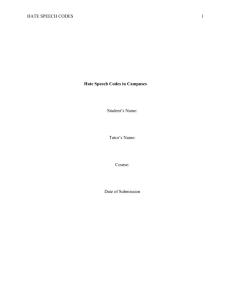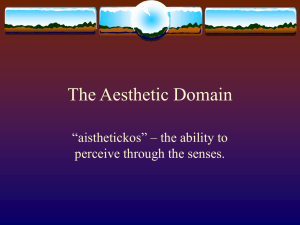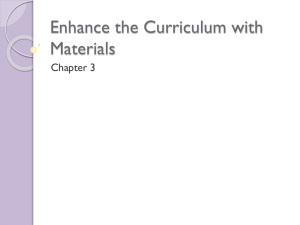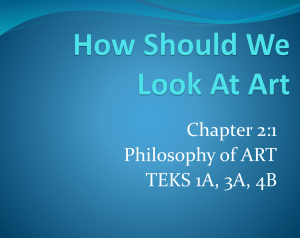Love, Law, and Culture - east
advertisement
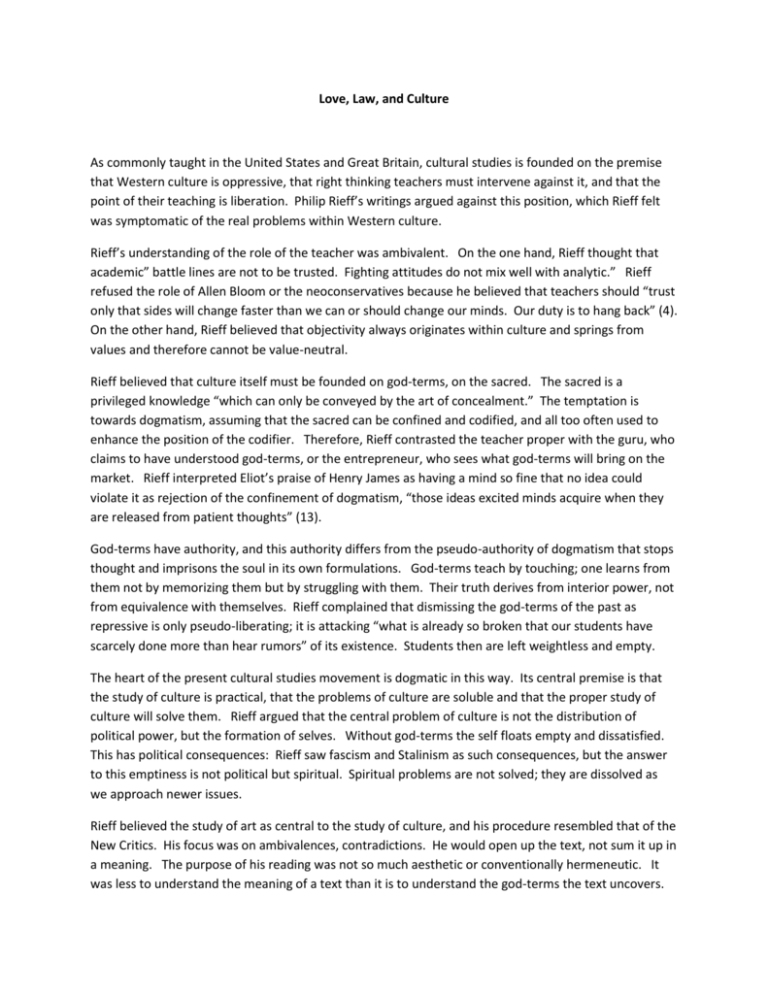
Love, Law, and Culture As commonly taught in the United States and Great Britain, cultural studies is founded on the premise that Western culture is oppressive, that right thinking teachers must intervene against it, and that the point of their teaching is liberation. Philip Rieff’s writings argued against this position, which Rieff felt was symptomatic of the real problems within Western culture. Rieff’s understanding of the role of the teacher was ambivalent. On the one hand, Rieff thought that academic” battle lines are not to be trusted. Fighting attitudes do not mix well with analytic.” Rieff refused the role of Allen Bloom or the neoconservatives because he believed that teachers should “trust only that sides will change faster than we can or should change our minds. Our duty is to hang back” (4). On the other hand, Rieff believed that objectivity always originates within culture and springs from values and therefore cannot be value-neutral. Rieff believed that culture itself must be founded on god-terms, on the sacred. The sacred is a privileged knowledge “which can only be conveyed by the art of concealment.” The temptation is towards dogmatism, assuming that the sacred can be confined and codified, and all too often used to enhance the position of the codifier. Therefore, Rieff contrasted the teacher proper with the guru, who claims to have understood god-terms, or the entrepreneur, who sees what god-terms will bring on the market. Rieff interpreted Eliot’s praise of Henry James as having a mind so fine that no idea could violate it as rejection of the confinement of dogmatism, “those ideas excited minds acquire when they are released from patient thoughts” (13). God-terms have authority, and this authority differs from the pseudo-authority of dogmatism that stops thought and imprisons the soul in its own formulations. God-terms teach by touching; one learns from them not by memorizing them but by struggling with them. Their truth derives from interior power, not from equivalence with themselves. Rieff complained that dismissing the god-terms of the past as repressive is only pseudo-liberating; it is attacking “what is already so broken that our students have scarcely done more than hear rumors” of its existence. Students then are left weightless and empty. The heart of the present cultural studies movement is dogmatic in this way. Its central premise is that the study of culture is practical, that the problems of culture are soluble and that the proper study of culture will solve them. Rieff argued that the central problem of culture is not the distribution of political power, but the formation of selves. Without god-terms the self floats empty and dissatisfied. This has political consequences: Rieff saw fascism and Stalinism as such consequences, but the answer to this emptiness is not political but spiritual. Spiritual problems are not solved; they are dissolved as we approach newer issues. Rieff believed the study of art as central to the study of culture, and his procedure resembled that of the New Critics. His focus was on ambivalences, contradictions. He would open up the text, not sum it up in a meaning. The purpose of his reading was not so much aesthetic or conventionally hermeneutic. It was less to understand the meaning of a text than it is to understand the god-terms the text uncovers. Rieff taught that “art is the deepest form of social direction. Either a work of art deepens the thrust of culture into character, creating ever deeper loyalties to the godheads most fully alive in (only in) their deepest order; or, in its present extremity, art subverts that order, goes down to murder its own godheads, and often, to mock its use of god-terms. It is interior space that is first reshaped, preliminary to the reshaping of social order” (20-21). Rieff contrasted his notion of art to the use of god-terms today, which are used to manipulate desire. These are “manufactured for instant use; none are constraining; all oppose constraint” (21). Rieff believed that modern culture rejects authority and acknowledges only power. The force subverting authority he called therapy. Therapy is a consequence of an acceptance of diversity. Rieff admitted that “a variety of faiths suits the complexity of human relations.” God-terms reduce complexity; in that sense they are world-rejecting. Therapy accepts the world in its complexity. In doing so, it is unable to accept the reality of evil. I’m OK, You’re OK. Rieff argued that this is a rejection of faith is formerly understood. “Faith is the horrified suspicion of justification” (23). Through eyes of faith, neither of us is OK. It is difficult to act without justification, and so we crave therapy or its more intellectual sibling ideology. As a cursory reading of the first books of the Bible indicate, god-terms tend towards blood-thirstiness, and therefore, those who would be teachers must “exercise a passion for good manners, grace, wit, and decorum—whatever will keep the life of the mind and its enacted violations a little distant from one another, away from the taste of blood” (24). Culture would teach the subtleties and complexities of god-terms. However, Rieff did not believe that it is simply the religious who have a taste for blood. He is frightened by the prospect of barbarianism. “Barbarians have never before existed. At the end of this tremendous cultural development, we moderns shall arrive at barbarism. Barbarians are people without historical memory. Barbarism is the real meaning of radical contemporaneity. Released from all authoritative pasts, we progress towards barbarism, not away from it” (39). Since romanticism modern culture has sought this release, and the result is the therapeutic. The therapeutic character above all desires to be free. The therapeutic character does not possess the passion of the romantic. It does not revolt from a single overwhelming authority. Instead it negotiates among a number of “authorities so long divided that none can assert themselves strongly” (45). This division prevents any single authority from writing itself deeply into the character, so that allegiances are superficial. One can wear one’s commitments on a tee shirt or a button. The therapeutic character is acutely sensitive because it lives on surfaces, but it feels its own emptiness and therefore it seeks a sublime for which it is not prepared. Instead it realizes the transgressive. Rieff argued that the modern world with its gulags and Gotterdammerungs has moved the transgressive from an aesthetic to a political sphere. In art the transgressive violates old forms to discover new forms. One sees this in the work of artists like Baudelaire, Joyce, or Beckett. An aesthetic movement during the Rieff’s own time took the notion of aesthetic violation to its ultimate conclusion; it rejected any form at all in favor of spontaneity, “first word best word.” But “first word best word” is very different from Baudelaire. Baudelaire is rebelling. He is discovering new possibilities the god-terms in the tradition he inherited. “First word best word” is a denial of the possibility of god-terms. All is the same. There is nothing to transgress against. Guilt has become neurotic and should be talked into oblivion. One of Rieff’s more striking formulations concluded an essay on Oscar Wilde: “God is not love; God is fear.” Fear must precede love. The promoters of “first word best word” have a similar take on love. “I met this guy in Wichita, and this other guy in DeKalb, and this other guy . . .” Rieff was very suspicious of the popular slogan of the sixties “Make Love, not War.” He pointed out that the kind of love being espoused was actually a form of war, the war of each against each. I think this is an accurate description of Ovid’s The Art of Love. In a world of culture” sexuality cannot be ‘liberated’; it can be more or less transgressive” (144). Fellow Teachers is a polemic against writers like Norman O. Brown, R. D. Laing and Charles Reich, proponents of eroticized reality. These writers have lost their cachet, but in many ways the world the world they advocated is ours without the countercultural trappings. Rieff feared the world they advocated. He saw their love as “disorder, rancorous, and perverse, a sentiment against authoritative form within which selves can be civil to others” (197). One response to Kipnis might be that love very inadequately tries to fill in the gap vacated when our culture gave up the respect necessary for civility. Love without respect becomes predatory. I value my worth on the market and then go out to seek an at least equivalent partner. As my market value fluctuates, I can shed or be shed. Such a reduction violates the very basis of previous cultural life. Life as an erotic adventure is a parody of self-perpetuation. The tendency of evolutionary biologists is to substitute self-perpetuation for telos. The ideology of erotic adventure denies even the telos of eros. We can think of eros as a calling of the body, a calling that becomes more powerful as other callings become muted. Rieff seems to me one of those who would stifle that call. He ignores the dictates of the body and proposes a law that challenges the flesh. The law is transcendent and in a different way calls us to itself. It asks us to discard much of what we are. Perfect love may cast out fear, but there must be an initial fear there to be cast out. Our culture, which fluctuates between a fundamentalist dogmatism and a narcissistic commercialism, is not creating the conditions under which such a love could arise.

